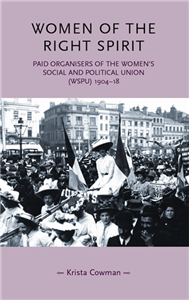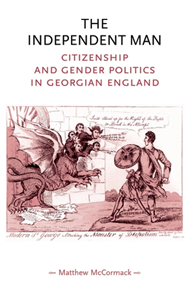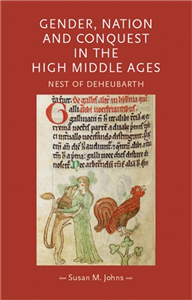Your Search Results
-
Promoted ContentHumanities & Social SciencesOctober 2017
Infidel feminism
by Laura Schwarz, Pamela Sharpe, Penny Summerfield, Lynn Abrams, Cordelia Beattie
-
Promoted ContentHumanities & Social SciencesFebruary 2013
Infidel feminism
by Laura Schwarz, Pamela Sharpe, Penny Summerfield, Lynn Abrams, Cordelia Beattie, Rebecca Mortimer
-
 Trusted Partner
Humanities & Social SciencesNovember 2005
Trusted Partner
Humanities & Social SciencesNovember 2005Myth and materiality in a woman’s world
by Lynn Abrams, Pamela Sharpe, Penny Summerfield, Lynn Abrams, Cordelia Beattie
-
 Trusted Partner
Humanities & Social SciencesSeptember 2017
Trusted Partner
Humanities & Social SciencesSeptember 2017Gender and housing in Soviet Russia
Private life in a public space
by Pamela Sharpe, Lynne Attwood, Penny Summerfield, Lynn Abrams, Cordelia Beattie
This book explores the housing problem throughout the 70 years of Soviet history, looking at changing political ideology on appropriate forms of housing under socialism, successive government policies on housing, and the meaning and experience of 'home' for Soviet citizens. Attwood examines the use of housing to alter gender relations, and the ways in which domestic space was differentially experienced by men and women. Much of Attwood's material comes from Soviet magazines and journals, which enables her to demonstrate how official ideas on housing and daily life changed during the course of the Soviet era, and were propagandised to the population. Through a series of in-depth interviews, she also draws on the memories of people with direct experience of Soviet housing and domestic life. Attwood has produced not just a history of housing, but a social history of daily life which will appeal both to scholars and those with a general interest in Soviet history.
-
 Trusted Partner
Humanities & Social SciencesMarch 2016
Trusted Partner
Humanities & Social SciencesMarch 2016Women, credit, and debt in early modern Scotland
by Cathryn Spence, Pamela Sharpe, Penny Summerfield, Lynn Abrams, Cordelia Beattie
-
 Trusted Partner
Humanities & Social SciencesSeptember 2013
Trusted Partner
Humanities & Social SciencesSeptember 2013Housewives and citizens
by Caitriona Beaumont, Pamela Sharpe, Penny Summerfield, Lynn Abrams, Cordelia Beattie
-
 Trusted Partner
Humanities & Social SciencesSeptember 2011
Trusted Partner
Humanities & Social SciencesSeptember 2011Elizabeth Wolstenholme Elmy and the Victorian Feminist Movement
by Maureen Wright, Pamela Sharpe, Penny Summerfield, Lynn Abrams, Cordelia Beattie
-
 Trusted Partner
Humanities & Social SciencesNovember 2008
Trusted Partner
Humanities & Social SciencesNovember 2008Living in sin
by Ginger Frost, Pamela Sharpe, Penny Summerfield, Lynn Abrams, Cordelia Beattie
-
 Trusted Partner
Humanities & Social SciencesMay 2014
Trusted Partner
Humanities & Social SciencesMay 2014Modern motherhood
by Angela Davis, Pamela Sharpe, Penny Summerfield, Lynn Abrams, Cordelia Beattie
-
 Trusted Partner
Humanities & Social SciencesSeptember 2013
Trusted Partner
Humanities & Social SciencesSeptember 2013Modern women on trial
by Lucy Bland, Pamela Sharpe, Penny Summerfield, Lynn Abrams, Cordelia Beattie
-
 Trusted Partner
Humanities & Social SciencesAugust 2011
Trusted Partner
Humanities & Social SciencesAugust 2011Love, Intimacy and Power
by Katie Barclay, Pamela Sharpe, Penny Summerfield, Lynn Abrams, Cordelia Beattie
-
 Trusted Partner
Humanities & Social SciencesOctober 2017
Trusted Partner
Humanities & Social SciencesOctober 2017Women police
by Louise Jackson, Pamela Sharpe, Penny Summerfield, Lynn Abrams, Cordelia Beattie
-
 Trusted Partner
Humanities & Social SciencesOctober 2017
Trusted Partner
Humanities & Social SciencesOctober 2017Being boys
by Melanie Tebbutt, Pamela Sharpe, Penny Summerfield, Lynn Abrams, Cordelia Beattie
-
 Trusted Partner
Humanities & Social SciencesDecember 2011
Trusted Partner
Humanities & Social SciencesDecember 2011Women of the right spirit
Paid organisers of the Women's Social and Political Union (WSPU), 1904–18
by Krista Cowman, Pamela Sharpe, Penny Summerfield, Lynn Abrams, Cordelia Beattie
This book is the first investigation on how official organizers built and sustained the national militant campaign of the Women's Social and Political Union between 1903 and 1918. Whilst the overall policy of the Union was devised by an ever-decreasing circle of women, centred around the mother-daughter team of Emmeline and Christabel Pankhurst, much of its actual activity, including its more extreme militant actions such as arson, was devised and implemented by these organizers who worked in the provinces and in London. Women of the right spirit reveals organizers to be a diverse bunch of women, whose class backgrounds ranged from the aristocratic to the extremely impoverished. It describes the ways in which they were recruited and deployed, and the work they undertook throughout Britain. The exhausting pace of their itinerant life is revealed as well as the occasions when organizers fell out with their employers or their own branches. Taking the story of the WSPU's workers up to the end of the First World War, it considers what directions they took when votes for women became a reality. The book will appeal to academics, postgraduates and undergraduates with an interest in women's history, as well as a more general readership wishing to understand the extent of support for the votes for women campaign and the mechanisms through which it organized. ;
-
 Trusted Partner
Humanities & Social SciencesJanuary 2012
Trusted Partner
Humanities & Social SciencesJanuary 2012The independent man
Citizenship and gender politics in Georgian England
by Matthew McCormack, Pamela Sharpe, Penny Summerfield, Lynn Abrams, Cordelia Beattie
'Independence' was an important ideal for men in Georgian England. In this period, however, the word meant much more than simply the virtues of self-sufficiency and impartiality. Most people believed that obligations absolutely compromised freedom and conscience, whereas 'independence' was associated with manly virtue and physical vigour. Fundamentally, the political world was thought to consist of 'independent men', exercising their consciences and standing up for the general good. As such, Georgians thought about political action and masculine virtue very differently to the ways in which we do today. In study, newly available in paperback, Matthew McCormack establishes the links between the histories of masculinity and politics, highlighting the centrality of 'manly' ideals in the political world and - conversely - the role of politics in the operation of gender ideology. ;
-
 Trusted Partner
Humanities & Social SciencesJune 2011
Trusted Partner
Humanities & Social SciencesJune 2011Destined for a Life of Service
Defining African–Jamaican womanhood, 1865–1938
by Henrice Altink, Pamela Sharpe, Penny Summerfield, Lynn Abrams, Cordelia Beattie
Based on a wide range of original sources, including folktales, anthropological studies, court statements, poetry and speeches, this book sheds new light on the struggle of people of African descent for full and equal citizenship in the post-emancipation British Caribbean. It examines the messages that African-Jamaican women were given about their place and roles from within and outside their own community, the extent to which these messages intersected with class and colour ideologies, and African-Jamaican women's attempts to realise these ideals of femininity amidst various constraints. Incorporating the full realm of African-Jamaican women's experiences, exploring not just their sexuality and reproduction but also their roles as labourers, citizens and freedom fighters, the book also links shifting gender ideologies to citizenship, race and nation. Essential reading for undergraduates and graduates interested in gender within the British Caribbean during the critical transformative period between 1865 and 1938, it will also interest political scientists and other scholars working on questions of nationalism, transnationalism and the gendered nature of citizenship. ;
-
 Trusted Partner
Humanities & Social SciencesOctober 2013
Trusted Partner
Humanities & Social SciencesOctober 2013Gender, nation and conquest in the high Middle Ages
Nest of Deheubarth
by Susan Johns, Pamela Sharpe, Penny Summerfield, Lynn Abrams, Cordelia Beattie
Nest of Deheubarth was one of the most notorious women of the Middle Ages, mistress of Henry I and many other men, famously beautiful and strong-willed, object of one of the most notorious abduction/elopements of the period and ancestress of one of the most famous dynasties in medieval Ireland, the Fitzgeralds. This volume sheds light on women, gender, imperialism and conquest in the Middle Ages. From it emerges a picture of a woman who, though remarkable, was not exceptional, representative not of a group of victims or pawns in the dramatic transformations of the high Middle Ages but powerful and decisive actors. The book examines beauty, love, sex and marriage and the interconnecting identities of Nest as wife/concubine/mistress, both at the time and in the centuries since her death, when for Welsh writers and other commentators she has proved a powerful symbol. ;
-
 Trusted Partner
Humanities & Social SciencesMay 2016
Trusted Partner
Humanities & Social SciencesMay 2016The women's liberation movement in Scotland
by Pamela Sharpe, Sarah Browne, Penny Summerfield, Lynn Abrams, Cordelia Beattie
-
 Trusted Partner
Humanities & Social SciencesMay 2016
Trusted Partner
Humanities & Social SciencesMay 2016Imagining Caribbean womanhood
by Rochelle Rowe, Pamela Sharpe, Penny Summerfield, Lynn Abrams, Cordelia Beattie
-
 Trusted Partner
Humanities & Social SciencesMay 2016
Trusted Partner
Humanities & Social SciencesMay 2016Women of letters
by Pamela Sharpe, Penny Summerfield, Lynn Abrams, Cordelia Beattie, Leonie Hannan

























